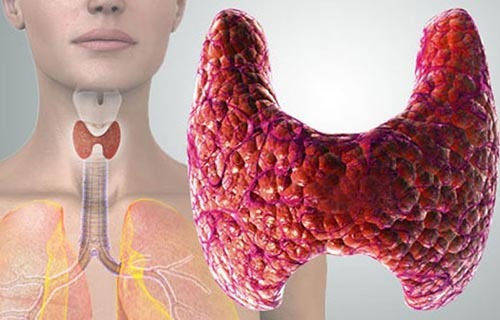Changes occurring in menopause have a total effect on the body. Hence the sudden arrival of some diseases, which with a reproductive system, it would seem, do not have a common. That's the thyroid gland in menopause can present unpleasant surprises, that is, to strengthen its manifestations and add new ones.
Why menopausal important work of thyroid
 The thyroid gland controls many processes in the body. It depends on:
The thyroid gland controls many processes in the body. It depends on:
- Metabolism;
- Body Weight Regulation;
- Sexual appetite;
- Heat Exchange;
- Psychoemotional state.
That is, all aspects of health that change in menopause. The thyroid gland closely cooperates with the brain to retain the balance of substances. The latter produces thyrotropin-releasing hormone( TRH) and thyroid-stimulating hormone( TSH) for the normal functioning of the gland. And it, in turn, produces thyroxine and triiodothyronine to maintain a balance of substances and normal state of health. Climax changes absolutely everything in this system, as the balance of hormones is broken.
What happens to the thyroid gland in the premenopausal
Changes in the menopause period are primarily hormonal, associated with a decrease in the amounts of estrogen and progesterone. They are caused by a different functioning of the hypothalamus, which directly affects the endocrine glands, including the thyroid gland. But she is able to undergo age-related changes, thus affecting the course of menopause, complicating it.
At the beginning of the period of extinction of the function of the ovaries, the thyroid gland increases in size, hypertrophies. It is manifested as signs of premenopause:
- Irritability;
- Tearfulness, whims;
- Increased anxiety.

It is important to distinguish normal changes from pathological, because similar symptoms may be manifestations of thyrotoxicosis. Its appearance against the background of extinction of sex hormones is also possible. And therefore it is important to control this part of the body from the very beginning of the premenopause, that is, to be examined.
Thyroid and postmenopausal
Thyroid gland in a later climax, that is, after a year of absence of critical days begins to decrease in size. This is a normal feature of its development, but it does not occur at all asymptomatically. That is, at first signs of hypotrophy are not expressed. But in some women it progresses, which causes already more noticeable changes:
- Dryness of the skin, brittle nails, hair weakening. This is a period of faster, than before, external aging;
- Memory deteriorates, work capacity, rather fatigue occurs;
- Hinder to live drowsiness, constant weakness;
- Feeling chill often, even at a fairly comfortable ambient temperature.
When studying the characteristics of the development of the thyroid gland in this period, it is important to correlate them with the pituitary gland. If the volume of thyroid hormones and triiodothyronine released by her decreases with the thyrotropic function of this part of the brain, the changes can be considered natural.
Make it all in the state of only a doctor, so in post-menopause it is important to monitor the functioning of the thyroid gland, despite the well-being.

Hyperfunction of the thyroid gland in menopause is caused by a change in the level of hormones in the body of a woman
Menopause and hyperfunction of the thyroid
The thyroid gland and menopause are related in such a way that the unsuccessful condition of the organ may masquerade as signs of ovarian failure. It has already been mentioned that in premenopause the increase in the gland's work is normal, because it is caused by the similarity of the body's reactions to its hormones and vanishing estrogens. But up to a certain limit.

Woman feels:
- Constant fever in the body;
- Weak muscles, tremors, sometimes convulsions;
- Accelerated heart rate;
- Loss of body weight with good appetite, as well as frequent defecation;
- Strong sweating, constant thirst;
- Chronically stressed nervous state.
Apparently, these manifestations are similar to climacteric, but they also have differences. To not aggravate them, it is necessary to hurry at suspicion to the endocrinologist.
 We recommend reading an article about the symptoms of menopause. You will learn about the reasons for the extinction of the reproductive function of the female body, the main manifestations of this condition, the need for drug therapy.
We recommend reading an article about the symptoms of menopause. You will learn about the reasons for the extinction of the reproductive function of the female body, the main manifestations of this condition, the need for drug therapy.
Hypofunction of the thyroid gland in the postmenopausal period
 Thyroid hypotrophy is natural and characteristic for the late menopause symptom. But in some, it becomes too much. This worsens the momentary state of health and increases the risks of diseases not related to the hormone-producing organ, but related to postmenopause.
Thyroid hypotrophy is natural and characteristic for the late menopause symptom. But in some, it becomes too much. This worsens the momentary state of health and increases the risks of diseases not related to the hormone-producing organ, but related to postmenopause.
What does the thyroid gland lead to if it is not active enough for menopause? The pathology provokes the following symptoms:
- Weight gain. It grows, despite the efforts to lose weight, diet and physical activity. This is due to a deficiency of the hormones of the gland causing a slowdown in metabolism;
- Memory impairment. Failures of processes in the brain caused by hormonal deficiency, lead to violations in this area. The danger of acquiring Alzheimer's disease is approaching;
- Strengthening of vasomotor signs. This happens because of the negative impact on the vessels suffering from a shortage of thyroxine and triiodothyronine. Although women with normal functioning in accordance with the age of the thyroid gland, they are declining. When her hypofunction develops heart disease, the heart attack becomes more likely;
- Osteoporosis. The destruction of bone tissue goes much faster, to those who do not experience such a deficiency of the hormones of the gland.
Climax and thyroid depend on each other more strongly than many suggest. And paying attention to gynecological health, they overlook the endocrine problems. Meanwhile, for some, they are key in poor health at this stage.
